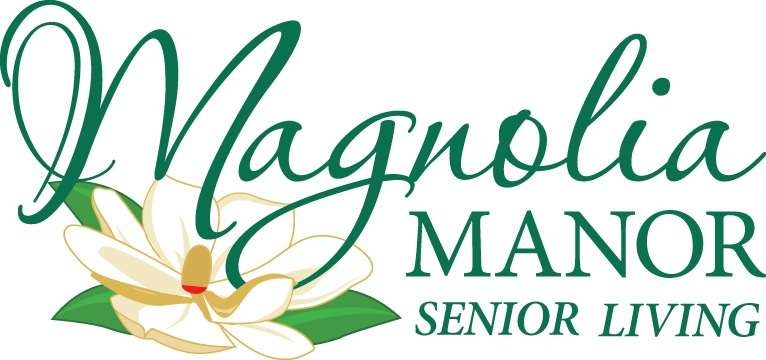Independent/Catered Living & Personal Care in Georgia
Don't have time to read this now? Download a PDF version instead.
Independent Living & Personal Care in Georgia
Independent living options for seniors come in almost as many shapes and sizes as seniors themselves.
Detached homes, townhomes, apartments, duplexes, villas, cottages, RVs and mobile home parks – housing options fit every description. But independent senior living is about more than the walls around you. It’s about the setting. The people. The amenities. And that special something we call atmosphere.
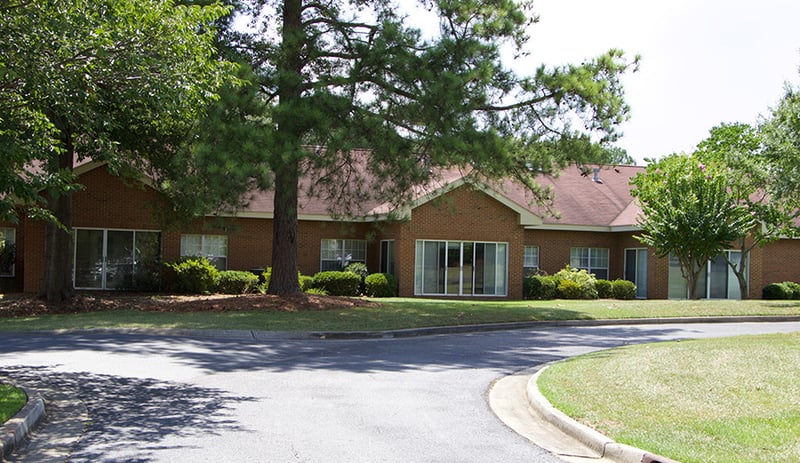
Independent senior living is about community.
Moving into independent senior living can be a relatively easy transition. Really, it is just a form of “downsizing” that older adults look forward to as the nest empties or they get tired of routine household chores and major upkeep challenges. Yes, the thought of leaving your home and all the memories it embodies can be a heart-stopper. It takes some getting used to. But that’s true for every move, doubly so when you’re scaling down.
Magnolia Manor is a faith-based, non-profit organization that serves residents of all faiths with an unswerving dedication to each person’s physical, social, emotional, and spiritual well-being. We offer various types of independent housing for seniors at most of our campuses – 5 out of 8, to be exact. These communities range from our largest (and original) Americus campus to diverse campuses in Macon, Moultrie, Richmond Hill, and St. Marys.
Among the five locations, there is a wide range of housing styles and sizes, not to mention community-specific amenities and daily living opportunities. The only thing that never varies is our dedication to ensuring a full and fulfilling life for residents in a homey, loving environment.
In this guide, we’ll explore what it means to be an independent senior. What are your retirement living options, and how on Earth do you choose? We’ll give you plenty to think about and stimulate additional questions you will want to ask. Hopefully, we will also inspire that inner voice that is telling you there will be more to love than regret about moving to an independent senior living community.
At Magnolia Manor, we have faith. We know that life is filled with changes, and at this point, you’re discovering options for your next life step. We are always available to help answer your questions.
Why Not Just Stay Home?
Maintaining a home is not as easy as it used to be, is it? At some point even those of us who love to work around the house and in the yard grow tired of so much work – planning and preparing meals, mowing and pruning and all the other green thumb tasks, laundry (who doesn’t hate folding laundry?), house cleaning. It never ends. It takes time. It’s wearing. Household repairs cost money, sometimes big money. Wouldn’t you rather spend all that energy and money on something else?
In a senior-focused retirement community you can actually retire.
You can ditch the headaches and hassle, retain your privacy, and as much “alone time” as you want. You can also avail yourself with a multitude of activities from arts and crafts to Zen yoga classes. Every senior living community offers its own range of educational, cultural, and fitness activities along with other amenities, but the goal is usually “something for everyone.” Here at Magnolia Manor, our communities are all different, yet they all provide a wealth of opportunities to exercise your body and mind and feed your spirit.
We like to call that living the carefree life!

Getting help to remain in your home
Some seniors have the financial resources to hire out work they no longer want to do, or can do, on their own. This can be especially helpful to handle heavy-lifting tasks such as home maintenance and yard work, but it can also include physical work such as housekeeping. However, not everyone can afford professional help.
More commonly, those closest to you – family members, neighbors, friends around town – will notice over time that you could use a little help. They love you, so they may step in to help around the house with cleaning or cooking, drive you to appointments and shopping, or even assist with personal tasks such as bathing and dressing.
Hiring help because you don’t want to do something is one thing. But there’s a difference between “chores” and what are called “activities of daily living,” or ADLs. There are many that are used to evaluate an individual’s ability to care for himself or herself, but a few are:
- Bathing, toileting, and incontinence
- Dressing
- Eating
- Personal hygiene and grooming
- Remembering to take prescribed medication, and taking it correctly
- Functional mobility
- Appropriate financial management, including paying bills on time
- Using the phone
Activities of daily living are basic requirements for living independently. Accepting personal help can be very difficult if it means admitting we cannot do everything for ourselves any more. That’s why, all too often, seniors rebuff caring overtures from friends and family. Many seniors also don’t want to overtly ask for help because they don’t want to “bother” friends or loved ones.
In truth, though, getting a little help with ADLs can help maintain your overall independence and ability to stay in your own home. Some seniors and their families turn to Meals on Wheels, private caregivers such visiting nurses or other at-home service providers to help with daily living tasks, transportation, etc.
These options can be especially helpful if just one spouse needs assistance. Couples can remain together in their home and the healthier spouse will not become increasingly over-worked. Ultimately, however, in-home assistance is only a temporary solution.

What’s so great about living independently in a “senior setting”?
With so many different options available, there are communities that fit beautifully with all types of independent seniors:
Couples - You still have each other and a zest for life. Senior independent living provides everything you love to do together (and the chance to remain together). But it also provides more opportunities to resource your individuality.
Singles - Senior independent living ensures privacy when you want alone time, but you don’t have to worry about becoming isolated, physically or emotionally. This is crucial because studies have proven that seniors who live alone are more likely to feel left out, become depressed and develop health problems, especially if they can no longer drive or have physical mobility issues. You may have well-meaning family or neighbors, but typically seniors don’t want to “impose” for transportation or togetherness.
Just one spouse - Loving couples support each other as they age. Sometimes separation becomes inevitable when one person needs more care than the other can provide. You may be able to move together into assisted living, but that’s not always possible. With the right senior living community, however, the spouse who requires additional support can move into an assisted living or memory care unit, and the other spouse can move into an independent living unit nearby. The proximity of living in the same community facilitates personal visits, and that bolsters peace of mind
Almost all Magnolia Manor communities offer multiple types of senior living to serve those with different types of needs. Five of our eight campuses include independent living housing as well as assisted living and/or memory care plus rehabilitation or skilled nursing.
 Make the move before you need formalized assistance
Make the move before you need formalized assistance
Eventually there may come a time when you will not be able to live independently. You’ll have to transition to assisted living, or perhaps even memory care. So why not make the most of your senior years while you’re still healthy and active, mentally and physically?
Think about all those things you’ve always said you could do – would do -- when you finally retire. By downsizing to independent senior living you can stop talking and do them! Say goodbye to household drudgery (yippee) and get busy with a life that’s more fun, interesting, uplifting and richly fulfilling instead.
But that takes advance planning. Giving yourself time to find just the right living situation to extend your independence will also give you the time you need to prepare mentally. That way, the transition will be easier and you will be excited to make the move. You made the choice, and it’s a good one!
Types of Independent Senior Living Communities
“Retirement community” covers a lot of ground. And with America’s senior population growing, the population of retirement communities is burgeoning as well. So far there are more than 250,000 senior independent housing units in the US. The problem, if you’re considering independent senior living, is not lack of options but an overwhelming number of choices.
Choice is good, because you want to discover a retirement living community that suits you to the proverbial “T.” And you can.
But choice can also be mind-boggling, so let’s try to unravel one of the most confusing elements – the different types of options. There are several distinct models when it comes to retirement communities, although some overlap in terms of amenities and services offered.

It’s an age thing
The one thing all retirement communities have in common is a minimum age restriction -- typically 55 or 62, but sometimes higher. That said, how each community treats its age minimum depends on local laws as well as the community itself. In some cases, only one spouse of a couple has to meet the requirement. In some cases, underage individuals (your grandkids, for instance) are allowed to visit but not stay longer than a certain period. More on that later.
By any other name
Retirement communities that serve active, healthy seniors are variously referred to as Active Adult, 55+, Independent Living, and Continuing Care. As you will see from the list below, some of these are communities in a traditional sense, with multiple buildings and a wide array of activities and amenities, whereas others are a single self-contained facility. Occasionally, they are managed by the residents themselves, but most often the community is professionally managed by a private company, a government agency, or such as is the case with Magnolia Manor, a non-profit organization.
Senior Apartments
The most common housing for independent seniors, these are privately operated buildings that may offer extras such as meals, transportation, social activities, fitness centers, gardens, salons, etc. for residents. These apartment complexes are sometimes called Congregate Care communities.
Age-Restricted Communities (often called 55+)
As noted above, the minimum age differs from one community to the next. The advantage of moving to a 55+ community is that you can enjoy all the benefits of retirement while still young, healthy and mobile without spending time on household chores. These retirement communities may offer both rental and purchase housing options and come with a centralized clubhouse, pool and other facilities.
.jpg?width=400&height=267&name=Buena%20Vista%20Singing%20(1338).jpg)
Sometimes there is an official activities director, but often socialization is informal and resident-directed as in any other neighborhood. Typically, these communities have no facilities or services for anyone who is not fully independent. The community may have a particular focus:
- Active retirement - If you’re into multiple kinds of recreation – biking, hiking, boating, swimming, etc. – a community like this will keep your body busy, helping to keep you in shape as you age.
- Faith-based - Some seniors would prefer to be surrounded by those with similar religious beliefs, for a stronger sense of spiritual congregation. At Magnolia Manor, we are faith-based, and all our communities offer religious services, study and counsel, but we openly welcome and serve residents of all faiths.
- Gated community - You may feel more secure or more private in a gated community, knowing not just anyone can come to your door. Inside the gates, you can enjoy all the amenities of any other 55+ type community.
- Golf or tennis resort environment - Can’t get enough of the court or the links? In a resort-sport community, you can zero in on your favorite activity and socialize with like-minded neighbors.
- Luxury living - High-end homes with high-end community features and amenities ensure you’ll have more affluent neighbors.
- RV Park instead of traditional housing - Some seniors give full rein to their wanderlust when they retire, trading in their home for a motorhome or RV and hitting the road. Senior RV Parks welcome them for long or short stays and a chance to mingle with new friends in their own age group.
- Singles only - Just because you’ve reached a “certain age” doesn’t mean you don’t prefer the single life. There are senior independent living communities designed just for single folks like you.
- University focus - Active seniors who love lifelong learning and a wide range of cultural activities can choose a community that has direct ties to a local university. You won’t have to be an alumnus to participate.
%20low%20rez.jpg?width=400&height=267&name=Macon%20NALW%20-%202022%20Hawaiian%20Luau%20(2874)%20low%20rez.jpg)
Continuing Care Retirement Communities (CCRCs)
CCRC is an official designation for a retirement community that provides a comprehensive spectrum of care, from fully independent living to assisted, memory care, skilled nursing and end-of-life care. Only individuals who have paid an entry fee can take advantage of the continuum of care, and no “outsiders” are allowed. Residents typically have to move from one unit to another as their care needs change, but they never leave the community itself.
For this, residents pay a hefty up-front fee that covers their basic living costs as they age in place, however many years that may be. Incidentals and other extras are usually charged separately. In rare cases, if there is money left in the resident’s “nest egg” at the time they pass away, the community will return a portion to the estate, but that is often a time-limited option.
Senior Co-Housing
This is like a private neighborhood, with homes that have been specially outfitted for aging in place as the senior residents require assisted living or nursing care. Often there is a house that is not used for sleeping but as a central facility for socializing, cooking, laundry, etc. Senior co-housing is managed like a homeowner association and can be cheaper than truly independent living thanks to shared expenses for food, utilities, etc.
Low-Income Senior Housing
The federal government builds and manages housing complexes that are available strictly to income-eligible seniors, through the Department of Housing and Urban Development.
Personal Care Homes
These are group living facilities for adults of any age who are disabled, require assistance with daily living tasks, suffer from memory loss, or who are simply frail. In the State of Georgia, the law defines “Personal Care Homes” as those which serve fewer than 25 adults and “Assisted Living Communities” as facilities that serve 25 or more adults. Neither provides independent retirement living.
What is Independent Senior Living Like?
One reason seniors are sometimes hesitant to consider moving to a retirement community is a misunderstanding of what life in these communities is really like. As you’ve detected by now, independent living communities for seniors vary tremendously in many respects, so there is no single, “this is it” picture. But we can give you an idea.
.jpg?width=400&height=599&name=St.%20Simons%20-%20The%20McKibbens%20(5768).jpg) First, let’s dispel three of the most common myths floating around about independent senior living:
First, let’s dispel three of the most common myths floating around about independent senior living:
1. You give up your independence
Ha! What you give up are tedious tasks that demand time and energy you can now devote to positive experiences. Or simply kicking back, minus any guilt that you “should” be cleaning, mowing, etc.
2. You give up your stuff
Senior living housing units are typically more compact, so you may have to downsize, but Magnolia Manor has units that have more than 2,300 square feet of living space. You will choose your most cherished essential furniture, photos, artwork, and of course clothing and linens to bring with you, so your new home will be entirely “you.”
3. You give up favorite hobbies
As you look into different independent living options for seniors, you will find that quality communities offer a plethora of things to do. Chances are excellent that you’ll discover other residents who share your love for a particular hobby, be it woodworking, quilting, reading, and even gardening.
What might your day look like?
Let’s look in on Margo, our fictional resident, who is loving her move to independent living at Magnolia Manor.
6:30 am: Margo is an early bird because she likes to watch the sunrise, but sometimes she treats herself to a sleep-in, especially if she stayed up late the night before, reading or watching a movie.
9’ish: She fixes herself breakfast. Some days she’s a “good girl” and makes oatmeal, but other days she goes for bacon and a small omelet.
10 am: Her friend Estelle arrives, and the two of them drive into town to shop for a birthday present for Margo’s nephew and pick up some fresh flowers for their apartments.
Noon: Margo and Estelle head home to enjoy a leisurely (and tasty!) lunch in the community’s dining room.
2 pm: Estelle heads back to her place, and Margo returns to her apartment to put her feet up and read a bit. Perhaps a nap is in order, snuggled under the beautiful afghan she brought from her previous home.
4 pm: Margo visits her neighbor Frank, who’s been a bit under the weather lately. She takes him the mystery she just finished reading. He loves mysteries, too, and this one was a real page-turner.
5:30 pm: Back home, Margo has changed into a smart dress and upgraded her makeup, because she is going back to town for dinner with friends and a play afterward.
10 pm: Margo is back home once again and getting ready for bed. It’s been another busy and thoroughly enjoyable day.
.jpg?width=400&height=266&name=Richmond%20Hill%20-%20Water%20Aerobics%20(1767).jpg)
Here are just some of the resident services and amenities you can find at some independent senior living communities:
- Beauty salon/barber shop
- Wellness programs and fitness centers
- Scheduled shuttle service for those without a car
- Game rooms
- Housekeeping
- Maintenance (repair techs as well as landscaping)
- Laundry service (or en suite washers and dryers)
- Restaurant-style dining room(s) and informal cafés
- Religious services, including Bible study and pastoral care
- Security guards
- Special events
- Arts and cultural programs
- Classes and workshops
- Outdoor recreation (swimming pool, tennis courts, adjacent golf course, fishing pond, etc.)
- Staff available 24/7, “just in case,” for round-the-clock peace of mind
Our holistic approach sets Magnolia Manor apart
The best senior living communities take care to offer a broad range of activities and amenities for residents. At Magnolia Manor, we take a truly comprehensive approach to senior living, because living a fulfilling life requires nourishing the heart and soul as well as the body and mind.

Each of our communities is unique in its setting, housing types and specific amenities and services available to independent residents. But every Magnolia Manor community speaks to mind, body and spirit in many ways.
Our Catered Living services help support independence
Technically, independent seniors are those who do not need assistance with any activities of daily living (ADLs). Nonetheless, some of our independent residents at Magnolia Manor find that, although they aren’t ready for Assisted Living, they wouldn’t turn down a little help with a daily task or two. So we offer Catered Living assistance that independent seniors can add as needed.
Our Macon and Richmond Hill communities offer a Catered Living option, essentially an à la carte menu of personal assistance extras that are available to independent residents for an additional fee.
What Happens When I Need More Assistance?
Typically, you will have to move to a different living unit when you are no longer able to live independently. How much of a move will that be? That depends on where you live at the time and the type of new care you will require.
At Magnolia Manor campuses where Catered Living services are available to independent residents, you can get a little extra assistance with certain daily living tasks. For example, let’s say you moved into an apartment in the Retirement Center on our Americus campus as an independent resident. You could stay in the same apartment and just add Catered Living services as needed. However, if you’re living in one of the Villas, you would have to move into the Retirement Center to get the extra help.
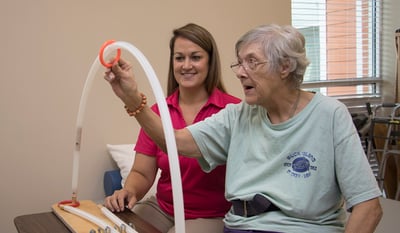
When Catered Living isn’t enough, or your needs have changed substantially, you can move to a more appropriate care level. Most likely that would be Assisted Living, but it could be Memory Care or even Rehabilitation or Skilled Nursing if you have a significant accident, stroke, heart attack, etc. Good news, though . . . Magnolia Manor’s full spectrum of care means you can stay within the “family.” You might be able to move to a different facility within the same community, or to another campus that can serve your new needs.
Although some of our advanced care facilities do have waiting lists, as a current Independent Living resident, you would automatically be placed at the top of the waiting list.
Senior living communities vary widely, so don’t assume what is the norm at Magnolia Manor is what you would find somewhere else. Asking about future care options is an important part of choosing a retirement community.
What Does Senior Independent Living Cost?
Expenses associated with independent living communities for seniors can vary dramatically, depending on the part of the country you live in, whether your community is urban or rural, and of course, the specific type of housing you choose and the amenities that are included (or not). If you choose a Continuing Care Retirement Community, you will have a major expense up front – according to AARP, the average buy-in is $329,000. Even that doesn’t cover all your optional living expenses.
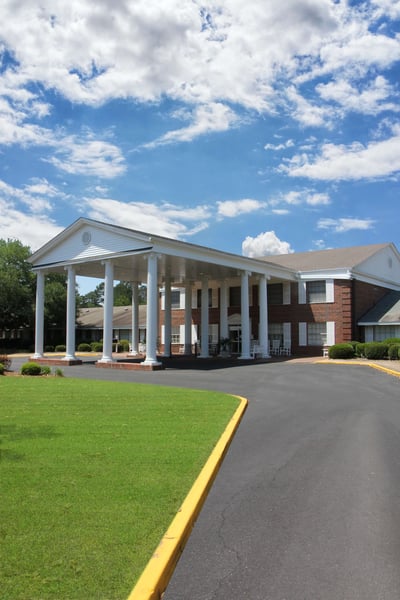 Fortunately for those with more modest resources, most communities charge by the month. Still, you could spend $100 or $10,000, depending on where you live. Cost matters to all of us, so the primary goal of your research into independent senior living possibilities is to find a place you’d love to live, at a cost you can afford.
Fortunately for those with more modest resources, most communities charge by the month. Still, you could spend $100 or $10,000, depending on where you live. Cost matters to all of us, so the primary goal of your research into independent senior living possibilities is to find a place you’d love to live, at a cost you can afford.
You know what you’re spending now on necessities as well as optional activities, etc. You may have a rent or mortgage payment, unless your home is paid off. You can count on a monthly payment in your new accommodations, too, though it will likely include certain extras. Every retirement community is different -- that’s true even among our Magnolia Manor campuses. But here are costs you’ll want to look for as you investigate options:
- Waiting list deposit
- Move-in fee
- Cable TV and/or WiFi
- Field trips
- Housekeeping
- Laundry
- Meals
- Parking
- Transportation
- Utilities
- Wellness programs/fitness center usage
Some senior independent living communities require long-term contracts, which can significantly affect your options. If you don’t want to sign a contract, you’ll have to choose somewhere else to live. If you do agree to a long-term contract, what will you do if your needs suddenly increase making current living arrangements inadequate?
At Magnolia Manor, we don’t require residents to sign a long term contract, nor do prospective residents need to have a gigantic nest egg in order to buy their way in to our way of life. All our residents pay a monthly fee. Just like the cost of everything else, these fees do increase from time to time. As you’re comparing costs of different communities, don’t forget to ask about future rate increases. Is there a past pattern of increases that will give you an idea of the amount and frequency you might expect?
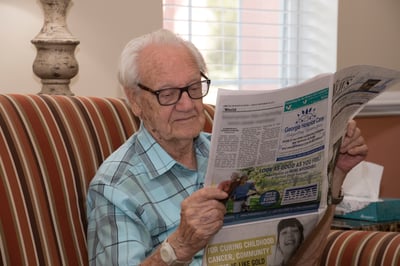
Use this handy Cost of Living Calculator to compare costs
You can select the campus you’re considering, say Americus. Then select the level of care you want – in this case independent living. Then choose the type of housing/floor plan you think you’d like (some of our communities have fewer options than others). Let’s pick the Garden Apartments.
The calculator displays a chart you can use to enter your current expenses and easily compare individual items as well as total cost with the housing you’ve selected. You can see what is included in your Plan, and what is not.
In our example, the calculator also notes that meals are not automatically included for Garden Apartment residents. As you consider your likely budget you’ll have to add grocery costs, or you can purchase an affordable meal plan and enjoy the delicious meals in our dining room without doing the cooking yourself.
As noted earlier, some of our communities include Supportive Housing with reduced rates. These rent-subsidized one-bedroom apartments are available at both Magnolia Manor Americus and Macon, so the calculator tells us that the Garden Apartments are eligible for this program.
We take pride in the fact that you don’t have to be rich to live a richer independent life at Magnolia Manor. In fact, we strive for affordability that might surprise you given the extensive range and quality of what we have to offer at each of our campuses.
Paying For Independent Senior Living
By definition, seniors who are able to live independently do not require special care or assistance from others. So moving to an independent senior living environment means you will still be financially responsible for your needs. You may get more for your money, since you won’t have to pay for yard work, etc. But whatever the cost, in the vast majority of cases, the funds will have to come from your own resources.
Those resources might include:
- Pension or Social Security payments
- Savings or annuity withdrawals
- IRAs or other retirement accounts
- A loan or line of credit (often used a bridge before your home is sold)
Our Affording Senior Living guide describes all the financial options and how you can plan ahead to have maximum resources at your disposal when it’s time to move to senior living.
%20low%20rez.jpg?width=400&height=266&name=Americus%20IL%20Residents%20-%20Mack%20and%20Linda%20Martin%20(1641)%20low%20rez.jpg)
On the other hand, help may be available
Earlier, we noted that some seniors receive assistance with “activities of daily living,” or ADLs, while still living in their homes. You may be able to continue to receive these same services after you move into an independent senior living community. At Magnolia Manor, we distinguish between these individual Catered Living services and Assisted Living, which is a more formalized level of care.
Some health insurance policies will cover expenses for in-home assistance with ADLs that is provided by licensed home-health workers. Also, some types of long-term care insurance policies cover Catered Living services. (Long-term care insurance is highly recommended for all seniors – something you should purchase in your 60s, ideally. It is crucial to understand in detail what will or will not be covered, because policies differ.)
Medicaid may also help with some costs if you meet the income and other eligibility requirements. Medicare, Medicaid, and health insurance will not pay your standard monthly fees for independent senior living.
Supportive Housing at Magnolia Manor
The federal Department of Housing and Urban Development (HUD) offers rent subsidies for low-income adults of all ages, not just seniors. In some cases, this can be applied to senior living facilities. HUD also has a program designed specifically to assist income-eligible independent seniors with housing costs.
We are very proud to say that our Magnolia Manor team worked to obtain a grant from HUD to provide Supportive Housing for residents at our campuses in Americus and Macon. Partnering with HUD in this way enables us to bring Magnolia Manor’s outstanding quality of life to seniors who are healthy and independent but who have limited means.
How to Choose an Independent Senior Living/Retirement Community
It’s easy to find communities that offer loads of flashy perks, beautiful gardens, etc. But keep in mind that the only features that matter are the ones that benefit your well-being. If you’re not a golfer, who cares that there’s a golf course? The “right” senior living situation is the one that suits you, or you and your spouse together, in the way you want to live independently.
The more comfortable you feel with the setting and the people, the more your new home will feel homey and comfortable after you move in. Make a list of what is most important to you.
 As you do your research, consider these key factors:
As you do your research, consider these key factors:
- Age range of residents (at Magnolia Manor, our minimum age is 62)
- Policies regarding children
- Activities of interest to residents
- What meals, if any, are provided
- What transportation is available for those without a car
- What is covered (and what is not) by monthly fees
- Extent of interaction between residents and the wider community
- Security and emergency protocols
- Are there aging in place options?
You won’t know till you see it
It is unwise to select a senior community without visiting. This will be your new neighborhood. These will be your new neighbors, and staff – the people who will help enrich your life and be there for you if something goes wrong, from an appliance breakdown to an emergency. Once you’ve narrowed your list of favorites, schedule a visit:
- Tour the entire community to get a feel for the facilities and overall surroundings
- Sit in on an event or activity
- Eat a meal
- Meet some people, both residents and staff
- Check out the wellness/fitness center
- Check out a housing unit like the one you’re considering
- Sit down for a one-on-one chat with staff to discuss your personal situation and desires
It’s best to visit more than once. After all, you want to be sure. Can you easily picture yourself living here?
Sooner is better
Every former Girl or Boy Scout knows how important it is to be prepared. No matter how well you planned for your retirement financially (or not), you can still plan where you want to live as an independent senior. You want to do that while you still have maximum choices available. For one thing, your favorite community may well have a waiting list.
How to find communities near you
Where do you want to live? Maybe you want to stay local, so you can remain near family, your church, and long-time friends. That will hardly seem like moving at all. You’ll still be independent; but without daily chores to attend to, you can spend more time with loved ones. You can go visiting and come home to your own peaceful home. And you can invite folks over for coffee or to share a meal or social activity at your senior living community.
On the other hand, making the move to independent senior living may be the perfect “excuse” to choose a location closer to the grandkids you don’t get to see very often. You can finally sit on the front lines as the little ones grow up, rather than feeling sidelined many miles away. And you’ll have an entire community of potential new friends to meet.
Or perhaps you just want a change of scenery. One of the things potential residents love about Magnolia Manor is that our campuses exemplify the geographic diversity that is Southern Georgia, from wooded rolling hills to coastal breezes. You can choose Magnolia Manor for independent living and still have multiple choices when it comes to setting, housing type, and community flavor.
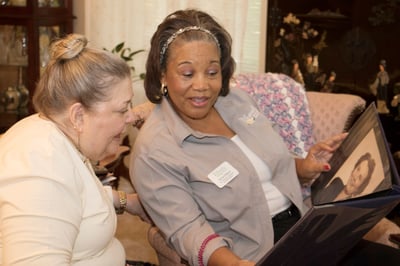
Picking a location is the place to start, so you can focus your search. There are lots of resources you can tap into to identify prospective communities you might like:
- Friends or relatives currently living in a retirement community – what do they like or not like about it?
- Your church – pastor and/or fellow congregants may have a referral for you
- Your primary care provider
- For-profit and non-profit senior care advisors and organizations
You can search for retirement communities and facilities by type and by state here.
What About Pets?
It can be harder to give up a beloved pet than to move away from your long-time home. However, this is an issue that many seniors face as they contemplate moving into a senior living environment. There are retirement communities that allow pets – most often cats and possibly small dogs, but rarely larger dogs. Most do not. Most of our Magnolia Manor communities do not allow pets.

Make sure to ask about pet policies (including for pets visiting residents) as you research communities. And be proactive about deciding your pet’s future if they cannot accompany you when you move. Is there a friend or family member who would adopt your furry friend? Ask your veterinarian if another client might take your pet into their family. Talk to your local no-kill animal shelter about placing your pet with a new family. Is there a local rescue group for your dog’s breed that handles placements?
Researching options ahead of time will give you peace of mind knowing that your precious companion will be moving into a great new home, just as you are, when the time comes.
Positively Independent
Most seniors will eventually require some type of long-term care assistance. Making the move to senior living while you are still healthy and active enables you to embrace all of the independence you still have, especially if you make the most of a positive one.
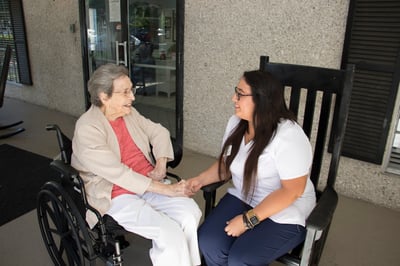
Yes, you will miss your home, more so the longer you’ve lived in it. But what you’re leaving behind isn’t the memories large and small, or even your most precious belongings. It’s the tedious chores. The physical labor of yard work. The endless expense of home maintenance. The worries about increasing taxes.
Instead of focusing on what you’ll “lose” if you choose independent senior living, start contemplating the possibilities. The things you’ve always wanted to enjoy but could not because you didn’t have time or the resources at hand. At Magnolia Manor, our comprehensive approach to independent senior living means you can eat, sleep, pray, love, make new friends and learn new things, all from the comfort of your own private space. That should give you the peace of mind and peace of spirit to move forward with confidence.
Conclusion
There are so many ways to stay active and engaged with Magnolia Manor independent living as your home base, you may be busier with friends and activities than ever before! It’s not really our goal to exhaust our residents, it’s just that we offer a tremendous variety of opportunities, all easily accessible right within our residential community. And then there are all the things you can do and see and eat and enjoy in nearby towns.
Moving to one of our communities opens doors. It becomes easier to do more of the things you love most, and easier to try your hand at new things you might never have considered before. Maybe those things weren’t available. Or you just didn’t have anyone to encourage (dare we say, prod) you into trying them! Who knows? You could discover an entirely new favorite hobby or fitness activity. One thing we do know – you’ll discover plenty of new friends with whom to socialize and share a spiritual connection.
We can’t wait to meet you and find out what unique attributes you will add to our Magnolia Manor community, no matter which independent living campus you choose. So come on down for an up-close-and-personal visit and chat.
